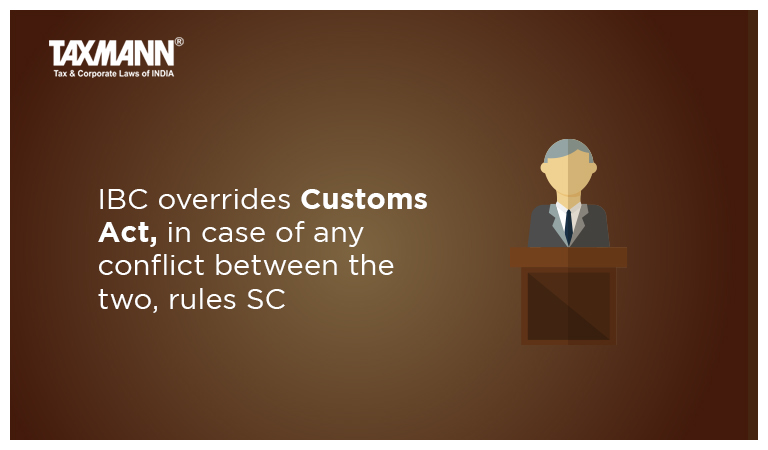IBC overrides Customs Act, in case of any conflict between the two, rules SC
- Blog|News|GST & Customs|
- 2 Min Read
- By Taxmann
- |
- Last Updated on 30 August, 2022

Case Details: Sundaresh Bhatt, Liquidator of ABG Shipyard v. Central Board of Indirect Taxes and Customs - [2022] 141 taxmann.com 471 (SC)
Judiciary and Counsel Details
-
- N.V. Ramana, CJI, J.K. Maheshwari & Hima Kohli, JJ.
Facts of the Case
The appellant was appointed as the Interim Resolution Professional and liquidator of a corporate debtor who was in the business of shipbuilding prior to the initiation of corporate insolvency proceedings against it. The corporate debtor imported various materials for the purpose of constructing ships and some of these goods were stored in Custom Bonded Warehouses. The appellant was granted custody of those warehoused goods by National Company Law Tribunal but CBIC filed appeal before National Company Law Appellate Tribunal (NCLAT).
NCLAT Held
The NCLAT held that the Corporate Debtor had abandoned the goods much before the insolvency process was initiated, and thereby the title of the goods had passed to the Customs Authority. The appellant filed civil appeal before the Supreme Court against grant of custody of warehoused goods to Customs Authority. The moot question before the Apex Court was that whether IBC overrides the Customs Act or vice versa.
The Honorable Supreme Court noted that IBC, being the more recent statute, clearly overrides the Customs Act. This is clearly made out by a reading of Section 142A of the Customs Act and NCLAT clearly failed to consider that in case of any conflict, the IBC overrides the Customs Act. Once, moratorium is imposed in terms of Sections 14 or 33(5) of the IBC, the Customs Authority does not have the power to initiate recovery of dues by means of sale/confiscation, as provided under the Customs Act.
Therefore, it was held that the Customs Department could not claim title over the goods and issue notice to sell the goods in terms of the Customs Act when the liquidation process has been initiated.
Disclaimer: The content/information published on the website is only for general information of the user and shall not be construed as legal advice. While the Taxmann has exercised reasonable efforts to ensure the veracity of information/content published, Taxmann shall be under no liability in any manner whatsoever for incorrect information, if any.

Taxmann Publications has a dedicated in-house Research & Editorial Team. This team consists of a team of Chartered Accountants, Company Secretaries, and Lawyers. This team works under the guidance and supervision of editor-in-chief Mr Rakesh Bhargava.
The Research and Editorial Team is responsible for developing reliable and accurate content for the readers. The team follows the six-sigma approach to achieve the benchmark of zero error in its publications and research platforms. The team ensures that the following publication guidelines are thoroughly followed while developing the content:
- The statutory material is obtained only from the authorized and reliable sources
- All the latest developments in the judicial and legislative fields are covered
- Prepare the analytical write-ups on current, controversial, and important issues to help the readers to understand the concept and its implications
- Every content published by Taxmann is complete, accurate and lucid
- All evidence-based statements are supported with proper reference to Section, Circular No., Notification No. or citations
- The golden rules of grammar, style and consistency are thoroughly followed
- Font and size that’s easy to read and remain consistent across all imprint and digital publications are applied



 CA | CS | CMA
CA | CS | CMA
